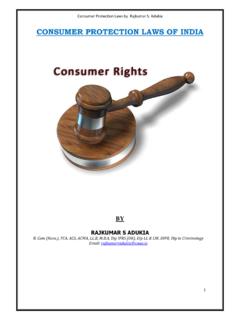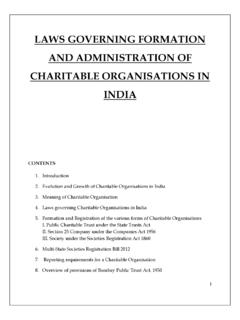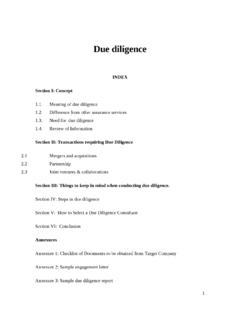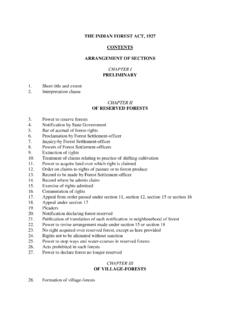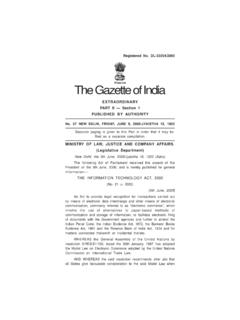Transcription of DIPR, DLL & LP, MBA, IFRS(UK) 098200 …
1 succession LAWS CA. Rajkumar S. Adukia (Hons.), FCA, ACS, ACWA, , DIPR, DLL & LP, MBA, IFRS(UK) 098200 61049/09323061049 email id: Website: To download information on various subjects visit To receive regular updates kindly send test email to INTRODUCTION Sucession is the transmission of property belonging to a person at his death to some other person or persons. succession and Inheritance can be of two kinds Testamentary or testate inheritance which means inheritance as per the Will of the deceased and Non Testamentary or intestate succession , where the deceased dies without making a Will. The law on intestate succession for different communities in India is governed by different succession laws applicable for that particular community. For the Hindu succession Act, indian succession act , Shariat laws etc. The law on testate succession is governed by the indian succession act , 1925 for all communities except Muslims. The law in relation to making of wills by Muslims is governed by the relevant Muslim Shariat Law as applicable to the Shias and the Sunnis.
2 With the exception of Muslims, the indian succession act , 1925 governs and has a common set of rules for persons of all religions. However, the Muslims shall be bound by the indian succession act , 1925 for the purpose of testamentary succession , if the will relates to immovable property situated within the State of West Bengal and within the jurisdiction of the Madras and Bombay High Courts. Applicability of the succession law to a person belonging to a particular community is explained in the following diagram: When a person dies Without making a valid Will After making a valid Will Hindu, Jain, Sikh, Buddhist Christian, Parsi, Jew Muslim Hindu succession Act indian succession act Muslim Law (Shurriyat) indian succession act Hindu, Jain, Sikh, Buddhist, Christian, Parsi, Jew Muslim Muslim Law (Shurriyat) indian succession act , 1925 The indian succession act came into operation on 30th September 1925 and it seeks to consolidate all Indian Laws relating to succession .
3 The Act consists of 11 parts, 391 sections and 7 schedules. This Act is applicable to intestate and testamentary succession . " succession " means capable of comprehending every kind of passing of property. When the British settled down to govern India, they were faced with the task of ascertaining the nature and incidents of the laws to be administered. With reference to the two main communities inhabiting the country, namely, the Hindus and Mohammadans, each of these communities had its own personal laws embodied in its sacred texts, but there were other smaller sections of the population which belonged to neither of these communities and in those cases it was not proper to administer the laws of a religion to which they did not owe any adherence or commitment. Amongst such minor communities were the Christians and Parsis. It was then the thought of enactment of law of sucession for the other communities was felt. Thus came the Indian succession Law. Consanguinity Part IV of the indian succession act deals with Consanguinity.
4 This part does not apply to intestate or testamentary succession to the property of any Hindu, Muhammadan, Buddhist, Sikh, Jain or Parsi. Consanguinity is the connection or relation of persons descended from the same stock or common ancestor. Lineal consanguinity is that which subsists between two persons, one of whom is descended in a direct line from the other, as between a man and his father, grandfather and great-grandfather, and so upwards in the direct ascending line; or between a man and his son, grandson, great-grandson and so downwards in the descending line. Collateral consanguinity is that which subsists between two persons who are descended from the same stock or ancestor, but neither of whom is descended in a direct line from the other. For the purpose of succession , there is no distinction (a) between those who are related to a person deceased through his father, and those who are related to him through his mother; or (b) between those who are related to a person deceased by the full blood, and those who are related to him by the half blood; or (c) between those who were actually born in the lifetime of a person deceased, and those who at the date of his death were only conceived in the womb, but who have been subsequently born alive.
5 Intestate succession Part V of the indian succession act deals with Intestate succession . This part will not apply to the property of any Hindu, Muhammadan, Buddhist, Sikh or Jain. Under the indian succession act , a man s widow and children, male and female, inherit equally. However, a man may, by Will can bequeath his or her property to anyone, totally disinheriting his own children and widow. MUSLIM LAW OF succession The Muslim law of succession is a codification of the four sources of Islamic law, which are (1) The Holy Koran, (2) The Sunna that is, the practice of the Prophet, (3) The Ijma that is, the consensus of the learned men of the community on what should be the decision on a particular point, and (4) The Qiya that is, an analogical deduction of what is right and just in accordance with the good principles laid down by God. Muslim law recognizes two types of heirs, the first being Sharers, and the second being Residuaries. A relative who is a Sharer will take a specified portion of the deceased's estate irrespective of anything else excepting for one important exception being the Rule of Awl and Radd.
6 A relative who is a Residuary will take whatever is left over, once the Sharers have taken their specified shares. The Sharers are 12 in number and are as follows: (1) Husband, (2) Wife, (3) Daughter, (4) Daughter of a son (or son's son or son's son's son and so on), (5) Father, (6) Paternal Grandfather, (7) Mother, (8) Grandmother on the male line, (9) Full sister (10) Consanguine sister (11) Uterine sister, and (12) Uterine brother. The share taken by each sharer will fluctuate in certain circumstances. For instance, a wife takes a one-fourth share in a case where the couple are without lineal descendants, and a one-eighth share otherwise. A husband (in the case of succession to the wife's estate) takes a half share in a case where the couple are without lineal descendants, and a one-fourth share otherwise. A sole daughter takes a half share. Where the deceased has left behind more than one daughter, all daughters jointly take two-thirds. However, these two rules apply only in cases where the deceased has left behind no sons.
7 If the deceased had left behind son(s) and daughter(s), then, the daughters cease to be sharers and become residuaries instead, with the residue being so distributed as to ensure that each son gets double of what each daughter gets. Lineal descendants (such as sons) exclude brothers and sisters, and therefore, the share of brothers and sisters (whether full, consanguine or uterine) will become nil in the presence of such descendants. Next is the Rule of Awl and Radd. There may be, and indeed there are, cases where the arithmetical sum of the fractional shares to which each Sharer is entitled, becomes more than One. This is not an absurdity. Muslim Law clearly provides for such contingencies as well. In such cases, the ratio of the shares held by each sharer is preserved, crystallized, and reworked out so as to ensure that they succeed to the available estate in that ratio. There is no concept of ancestral property or rights by birth in the case of Muslim succession .
8 The rights that a Muslim's heirs acquire upon his death are fixed and determined with certainty on that date and do not fluctuate. Widow s right to succession Under Muslim law, no widow is excluded from succession . A childless Muslim widow is entitled to one-fourth of the property of the deceased husband, after meeting his funeral and legal expenses and debts. However, a widow who has children or grandchildren is entitled to one-eighth of the deceased husband's property. If a Muslim man marries during an illness and subsequently dies of that medical condition without brief recovery or consummating the marriage, his widow has no right of inheritance. But if her ailing husband divorces her and afterwards, he dies from that illness, the widow's right to a share of inheritance continues until she remarries. Legitimacy under Muslim Law Parentage is only established in the real father and mother of a child, and only if they beget the child in lawful matrimony.
9 In Hanafi Law maternity is established in the case of every child but in Shiite Law, maternity is established only if the child is begotten in lawful wedlock. They (Sunnis or the Hanafis) adopt a view that an illegitimate child, for certain purposes, such as for feeding and nourishment, is related to the mother. For these purposes the Hanafi Law confers some rights on its mother. In Muslim Law, a son to be legitimate must be the offspring of a man and his wife or that of a man and his slave; any other offspring is the offspring of Zina , which is illicit connection, and hence is not legitimate. The term 'wife' essentially implies marriage but marriage may be entered into without any ceremony, the existence of marriage therefore in any particular case may be an open question. Direct proof may be available, but if there be no such proof, indirect proof may suffice. Now one of the ways of indirect proof is by an acknowledgement of legitimacy in favour of a son.
10 This acknowledgement must be made in such a way that it shows that the acknowledger meant to accept the other not only as his son, but also as his legitimate son. Thus under Muslim Law acknowledgement as a son prima facie means acknowledgement as a legitimate son. Therefore, under the Muslim Law there is no rule or process, which confers a status of legitimacy upon children proved to be illegitimate. The Privy Council in Sadiq Hussain v. Hashim Ali pithily laid down this rule: "No statement made by one man that another (proved to be illegitimate) as his son can make other legitimate, but where no proof of that kind has been given, such a statement or acknowledgement is substantive evidence that the person so acknowledged is the legitimate son of the person who makes the statement, provided his legitimacy is possible." In Muslim law, the illegitimate child has no right to inherit property through the father and in the classical law, as well as in some modern Islamic jurisdictions, the mother of an illegitimate child may well find herself subject to harsh punishments imposed or inflicted on those found guilty of zina.





